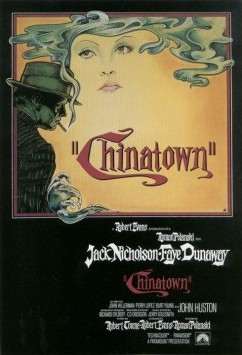Pages
▼
Thursday, February 4, 2016
Chinatown (Roman Polanski, 1974)
Where there's money, there's murder, and where the sun shines brightest, the shadows are darkest. That's why film noir was invented in Hollywood, and why California's greatest contribution to American literature may have been the pulp fiction of James M. Cain and the detective novels of Dashiell Hammett, Raymond Chandler, and Ross Macdonald. Chinatown, which draws on that tradition, has a kind of valedictory quality about it, harking back to the 1930s roots of noir, although the genre's heyday was the postwar 1940s and paranoia-filled early 1950s. (Curtis Hanson would exploit that latter era in his 1997 film L.A. Confidential.) But it's also very much a film of the 1970s, which is to say that 42 years have passed and Chinatown is showing its age. The revelation that Katherine (Belinda Palmer) is both the daughter and the sister to Evelyn Mulwray (Faye Dunaway) no longer has the power to shock that it once did, incestuous rape having become a standard trope of even TV drama. Nor does the "dark" ending, which director Roman Polanski insisted on, despite screenwriter Robert Towne's preference for a more conventionally hopeful resolution, seem so revolutionary anymore. It remains a great film, however, thanks to those quintessential '70s stars, Dunaway and Jack Nicholson, in career-defining performances, the superb villainy of John Huston's Noah Cross, and Roman Polanski's deft handling of Towne's intricate screenplay, carefully keeping the film limited to the point of view of Nicholson's Jake Gittes. Production designer Richard Sylbert and costume designer Anthea Sylbert (Richard's sister-in-law), aided by cinematographer John A. Alonzo, are responsible for the stylish evocation of 1930s Los Angeles. The atmospheric score is by Jerry Goldsmith.
Charles Matthews
